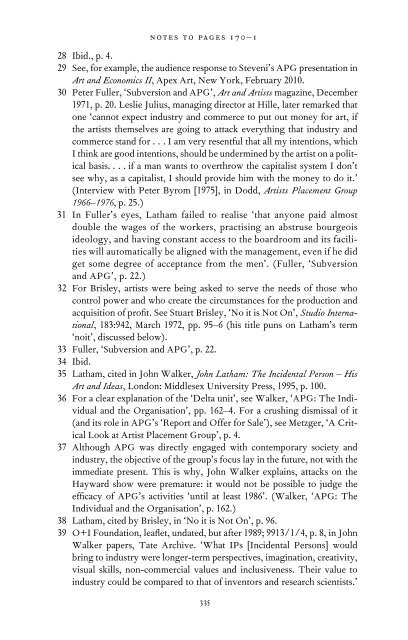Participatory Art and the Politics of Spectatorship - autonomous ...
Participatory Art and the Politics of Spectatorship - autonomous ...
Participatory Art and the Politics of Spectatorship - autonomous ...
You also want an ePaper? Increase the reach of your titles
YUMPU automatically turns print PDFs into web optimized ePapers that Google loves.
notes to pages 170– 1<br />
28 Ibid., p. 4.<br />
29 See, for example, <strong>the</strong> audience response to Steveni’s APG presentation in<br />
<strong>Art</strong> <strong>and</strong> Economics II, Apex <strong>Art</strong>, New York, February 2010.<br />
30 Peter Fuller, ‘Subversion <strong>and</strong> APG’, <strong>Art</strong> <strong>and</strong> <strong>Art</strong>ists magazine, December<br />
1971, p. 20. Leslie Julius, managing director at Hille, later remarked that<br />
one ‘cannot expect industry <strong>and</strong> commerce to put out money for art, if<br />
<strong>the</strong> artists <strong>the</strong>mselves are going to attack everything that industry <strong>and</strong><br />
commerce st<strong>and</strong> for . . . I am very resentful that all my intentions, which<br />
I think are good intentions, should be undermined by <strong>the</strong> artist on a political<br />
basis. . . . if a man wants to overthrow <strong>the</strong> capitalist system I don’t<br />
see why, as a capitalist, I should provide him with <strong>the</strong> money to do it.’<br />
(Interview with Peter Byrom [1975], in Dodd, <strong>Art</strong>ists Placement Group<br />
1966– 1976, p. 25.)<br />
31 In Fuller’s eyes, Latham failed to realise ‘that anyone paid almost<br />
double <strong>the</strong> wages <strong>of</strong> <strong>the</strong> workers, practising an abstruse bourgeois<br />
ideology, <strong>and</strong> having constant access to <strong>the</strong> boardroom <strong>and</strong> its facilities<br />
will automatically be aligned with <strong>the</strong> management, even if he did<br />
get some degree <strong>of</strong> acceptance from <strong>the</strong> men’. (Fuller, ‘Subversion<br />
<strong>and</strong> APG’, p. 22.)<br />
32 For Brisley, artists were being asked to serve <strong>the</strong> needs <strong>of</strong> those who<br />
control power <strong>and</strong> who create <strong>the</strong> circumstances for <strong>the</strong> production <strong>and</strong><br />
acquisition <strong>of</strong> pr<strong>of</strong>i t. See Stuart Brisley, ‘No it is Not On’, Studio International,<br />
183:942, March 1972, pp. 95– 6 (his title puns on Latham’s term<br />
‘noit’, discussed below).<br />
33 Fuller, ‘Subversion <strong>and</strong> APG’, p. 22.<br />
34 Ibid.<br />
35 Latham, cited in John Walker, John Latham: The Incidental Person – His<br />
<strong>Art</strong> <strong>and</strong> Ideas, London: Middlesex University Press, 1995, p. 100.<br />
36 For a clear explanation <strong>of</strong> <strong>the</strong> ‘Delta unit’, see Walker, ‘APG: The Individual<br />
<strong>and</strong> <strong>the</strong> Organisation’, pp. 162– 4. For a crushing dismissal <strong>of</strong> it<br />
(<strong>and</strong> its role in APG’s ‘Report <strong>and</strong> Offer for Sale’), see Metzger, ‘A Critical<br />
Look at <strong>Art</strong>ist Placement Group’, p. 4.<br />
37 Although APG was directly engaged with contemporary society <strong>and</strong><br />
industry, <strong>the</strong> objective <strong>of</strong> <strong>the</strong> group’s focus lay in <strong>the</strong> future, not with <strong>the</strong><br />
immediate present. This is why, John Walker explains, attacks on <strong>the</strong><br />
Hayward show were premature: it would not be possible to judge <strong>the</strong><br />
effi cacy <strong>of</strong> APG’s activities ‘until at least 1986’. (Walker, ‘APG: The<br />
Individual <strong>and</strong> <strong>the</strong> Organisation’, p. 162.)<br />
38 Latham, cited by Brisley, in ‘No it is Not On’, p. 96.<br />
39 O+I Foundation, leafl et, undated, but after 1989; 9913/ 1/ 4, p. 8, in John<br />
Walker papers, Tate Archive. ‘What IPs [Incidental Persons] would<br />
bring to industry were longer- term perspectives, imagination, creativity,<br />
visual skills, non- commercial values <strong>and</strong> inclusiveness. Their value to<br />
industry could be compared to that <strong>of</strong> inventors <strong>and</strong> research scientists.’<br />
335
















